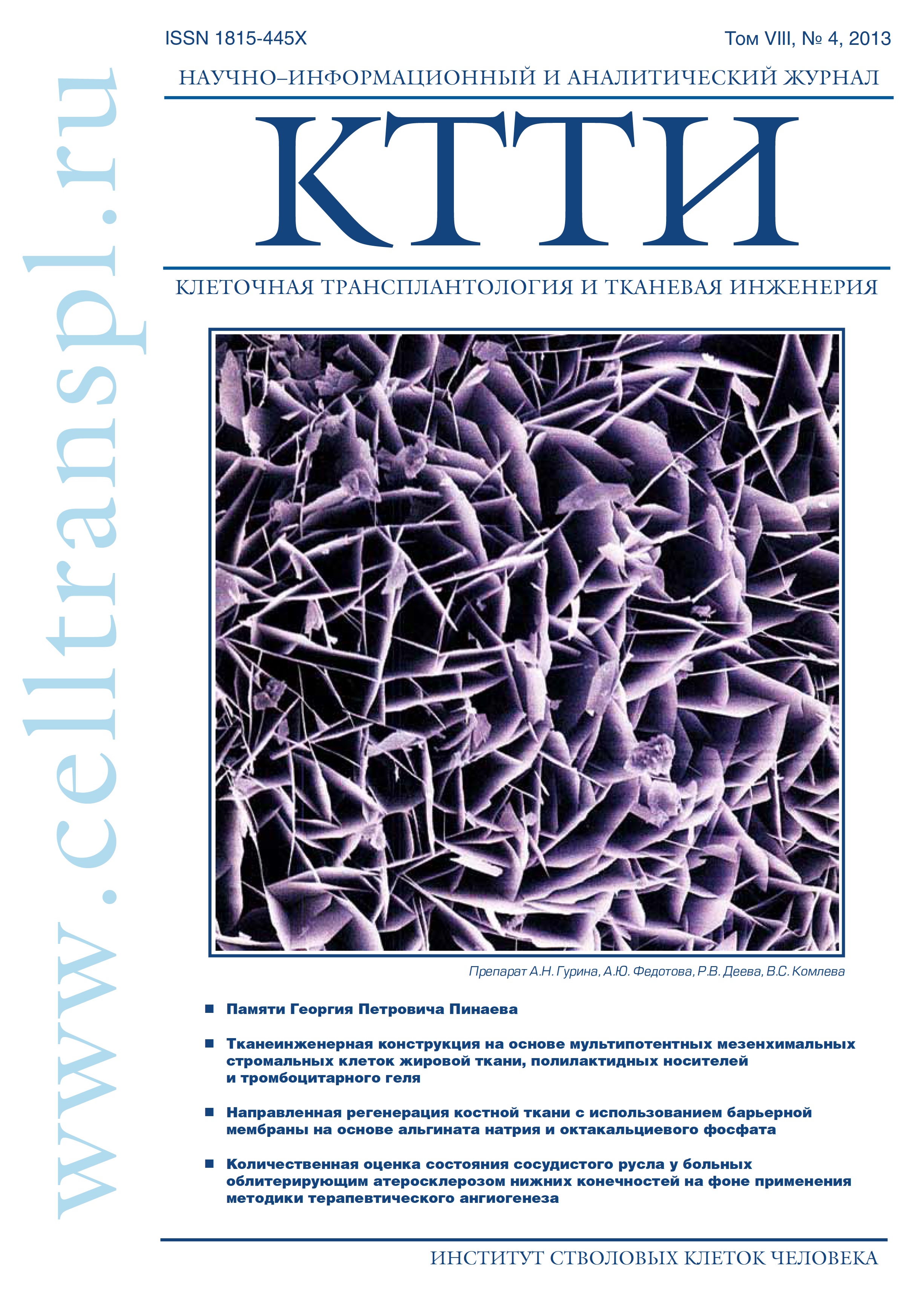Decellularization as a prevention of immune response activation to allogeneic pulmonary valves
- Authors: Sergeevichev D.S1, Sergeevicheva V.V2, Subbotovskaya A.I1, Vasilyeva M.B1, Dokuchayeva A.A1, Karaskov A.M1, Kozlov V.A2
-
Affiliations:
- E.N. Meshalkin Novosibirsk Research Institute of Circulation Pathology, Novosibirsk
- Research Institute of Clinical Immunology, SB of the RAMS, Novosibirsk
- Issue: Vol 8, No 4 (2013)
- Pages: 55-60
- Section: Articles
- URL: https://genescells.ru/2313-1829/article/view/121613
- DOI: https://doi.org/10.23868/gc121613
- ID: 121613
Cite item
Abstract
About the authors
D. S Sergeevichev
E.N. Meshalkin Novosibirsk Research Institute of Circulation Pathology, Novosibirsk
V. V Sergeevicheva
Research Institute of Clinical Immunology, SB of the RAMS, Novosibirsk
A. I Subbotovskaya
E.N. Meshalkin Novosibirsk Research Institute of Circulation Pathology, Novosibirsk
M. B Vasilyeva
E.N. Meshalkin Novosibirsk Research Institute of Circulation Pathology, Novosibirsk
A. A Dokuchayeva
E.N. Meshalkin Novosibirsk Research Institute of Circulation Pathology, Novosibirsk
A. M Karaskov
E.N. Meshalkin Novosibirsk Research Institute of Circulation Pathology, Novosibirsk
V. A Kozlov
Research Institute of Clinical Immunology, SB of the RAMS, Novosibirsk
References
- Cornwell K.G., Landsman A., James K.S. et al. Extracellular matrix biomaterial for soft tissue repair. Clin. Podiat. Med. Surg. 2009; 26(4): 507-23.
- Troost E., Meyns B., Daenen W. et al. Homograft survival after tetralogy of Fallot repair: determinants of accelerated homograft degeneration. Euro. Heart J. 2007; 28(20): 2503-9.
- Verghese S., Cherian K.M. HLA expression in aortic and pulmonary homografts: effects of cryopreservation. Indian Heart J. 2002; 54(4): 394-8.
- Bloch O., Golde P., Dohmen P.M. et al. Immune response in patients receiving a bioprosthetic heart valve: lack of response with decellularized valves. Tissue Engineering, Part A 2011; 17(19-20): 2399-405.
- Lehr E.J., Rayat G.R., Chiu B. et al. Decellularization reduces immunogenicity of sheep pulmonary artery vascular patches. J. Thor. Cardiovasc. Surg. 2011; 141: 1056-62.
- Zhou J., Fritze O., Schleicher M. et al. Impact of heart valve decellularization on 3-D ultrastructure, immunogenicity and thrombogenicity. Biomaterials 2010; 31(9): 2549-54.
- Guinan E.C., Gribben J.G., Boussiotis V.A. et al. Pivotal role of the B7: CD28 pathway in transplantation tolerance and tumor immunity. Blood 1994; 84(10): 3261-82.
- Tsai M.K., Ho H.N., Chien H.F. et al. Multiple negative feedbacks on CD152 expression in allograft tolerance. Transplantation 2005; 79(2): 174-81.
- Schmidt-Lucke C., Aicher A., Romagnani P. et al. Specific recruitment of CD4+CD25++ regulatory T cells into the allograft in heart transplant recipients. Amer. J. Physiol. Heart Circ. Physiol. 2007; 292(5): H2425-31.
- Duan Z., Zhang Y., Pan F. et al. Association between CTLA4 gene polymorphisms and acute rejection of kidney transplantation: a meta-analysis. Nephrology 2012; 25(6): 996-1002.
- Jashari R., Goffin Y., Vanderkelen A. et al. European homograft bank: twenty years of cardiovascular tissue banking and collaboration with transplant coordination in Europe. Transpl. Proc. 2010; 42: 183-9.
- Васильева М.Б., Сергеевичев Д.С., Юношев А.С. и др. Морфофункциональная оценка ферментативного и детергентного способов децеллюляризации сердечных аллографтов. Патология кровообращения и кардиохирургия 2012; 2: 77-80.
- Сергеевичев Д.С., Сергеевичева В.В., Субботовская А.И. и др. Токсическое влияние детергентов на мезенхимальные стро-мальные клетки человека при заселении графтов. Патология кровообращения и кардиохирургия 2013; 2: 67-71.
- Alegre M., Fallarino F., Zhou P. et al. Transplantation and the CD28/CTLA4/B7 pathway. Transpl. Proc. 2001; 33(1-2): 209-11.
- Studer S.M., George M.P., Zhu X. et al. CD28 down-regulation on CD4 T cells is a marker for graft dysfunction in lung transplant recipients. Amer. J. Resp. Crit. Care Med. 2008; 178(7): 765-73.
- Poirier N, Azimzadeh A.M, Zhang T. et al. Inducing CTLA-4 - dependent immune regulation by selective CD28 blockade promotes regulatory T cells in organ transplantation. Scien. Transl. Med. 2010; 2(17): 17ra10.
- Dai S.X., Wu G., Zou Y. et al. Balance of CD8+ CD28+ / CD8+ CD28- T lymphocytes is vital for patients with ulcerative colitis. Digest. Dis. Sci. J. 2013; 58(1): 88-96.
- Kucharska A.M., Gorska E., Wasik M. et al. Altered expression of T lymphocyte surface markers in children with chronic autoimmune thyroiditis. Nat. J. Physiol. Pharm. Pharmacol. 2008; 59, Suppl. 6: 375-82.
- Greene J.L., Leytze G.M., Emswiler J. et al. Covalent dimerization of CD28/CTLA-4 and oligomerization of CD80/CD86 regulate T cell costimulatory interactions. J. Biol. Chem. 1996; 271(43): 26762-71.
- Van der Merwe P.A., Bodian D.L., Daenke S. et al. CD80 (B7-1) binds both CD28 and CTLA-4 with a low affinity and very fast kinetics. J. Exper. Med. 1997; 185: 393-403.
Supplementary files










